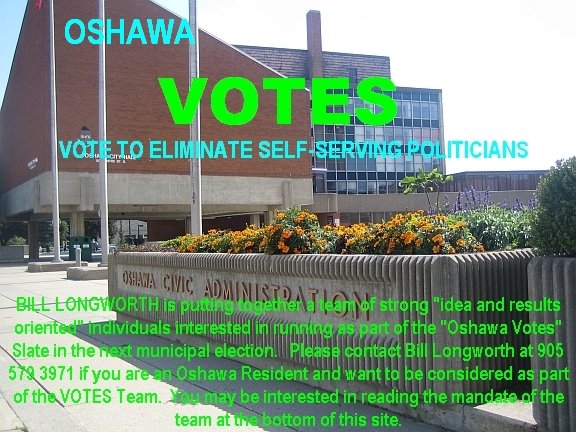The following was presented at the public meeting at Sikorski Hall on April 19. It is reprinted with permission.
Submission to Oshawa Council
Thursday 2007/04/19
Submission by: Paul-André Larose, Ph.D
E-Mail: LarosePA@Sympatico.Ca
- - -
I – Introduction
Good evening members of the Oshawa Council and of the audience,
I want to express my concern at what is currently going on with respect to the voting protocol in Oshawa. In the process, we have expended much resource, personal and civic, in addressing an artificially created problem, all this at a time when we have so many real pressing ones.
If fact, Council has effectively “painted itself into a corner” and now, we must identify and accomplish some face-saving remedial actions. In actuality, this means finding ways to truly validate the wishes of the electorate and avoid basing actions on the basis of questionable data.
If the so-called “General Voting” is such a great electoral system, then WHY NOT use it at the…
• Regional level and adopt the concept of Regional Councilors residing anywhere within the Region can represent a given municipality;
• Provincial level and adopt the concept of MPP’s residing anywhere within the Province can represent a given Provincial Constituency;
• Federal level and adopt the concept of MP’s residing anywhere within the Country can represent a given Federal Constituency.
This, obviously, does not make sense.
II – The Facts
The Ballot Questions:
• “Are you in favour of electing those Councillors who represent the City on City Council and on Regional Council by General Vote as opposed to Ward Vote?”
• “Are you in favour of electing those Councillors who represent the City only on City Council by General Vote as opposed to Ward Vote?”
Critique:
• Wording: “who represents the City”. I thought that Councillors represented the Voters, not the City.
• The question is convoluted: one had to say “no” in order to mean “yes”, i.e. keep as is.
• There is some possibility of misinterpretation, e.g. see below.
Public Information Sessions:
• These were questionable at best and were not what they should have been.
• I try to be well informed, but obviously, I failed on this issue …
Voting Statistics:
• 25.1% of eligible voters.
• Is this democracy if change is made on the basis of 25% participation?
• How does this fit with the City’s Web based header that says, “The Power of Democracy is YOU!”?
III – Possible Misinterpretation
The Question makes reference to the “General Vote” … What is the General Vote?
• Possible interpretation of General Vote: Citizenship vs Residency
• It should have been said “City-Wide” or the likes
IV – The Only Option
The current situation being as it is, we should do 4 things, in addition to formally deploring the low participation level and the lack of information that has accompanied the project:
1. Recognize the democratically expressed result;
2. Acknowledge the post-election malaise;
3. Validate the intent of the population through information and follow-up referendum;
4. Commit itself to thoroughness in the democratic assessment.
We do not want to reject the result about one issue (e.g. voting) while accepting the result about another one (e.g. Regional Chair); this would amount to a selective acceptance of results.
In other words, we do not want, or suggest, some form of autocratic selective process; we are not intellectual Ayatollahs. We simply want thoroughly reliable data.
Furthermore, we do not recommend querying the public until we get the desired outcome.
Note: In Research, one does NOT draw conclusion on the basis of a SINGLE experiment (e.g. Cold Fusion, etc…)
V – Recommendations
Thus, we expect the City to basically do 4 things:
1. Avoid rushing into major electoral changes on the basis on an apparently flawed process;
2. Thoroughly inform citizenry about the voting options;
3. Oversee a clear validating referendum on the issue;
4. Abide by the results thus obtained which serve to confirm, or infirm, the earlier ones.
Editor's Comment
Dr. Larose makes some astute observations
1. The whole thing is a politically manufactured "problem"
2. If the general vote is best, why not support its use at all levels of government?
3. Very astute point---politicians represent people, not the city! Does this affect the validity of the plebiscite question?
4. The confusing and convoluted question...voters required to vote NO to mean YES!--interesting way to put this fact!
5. Undefined term used in plebiscite question---term "general vote" has different meanings to different people...therefore question was ambiguous
6. Conclusion--based on questionable data, Dr. Larose feels council should not rush into change...but do a follow up plebiscite after fully informing people and promoting public debate...a conclusion we fully support...Democracy can only work with a fully informed public!
Subscribe to:
Post Comments (Atom)


No comments:
Post a Comment